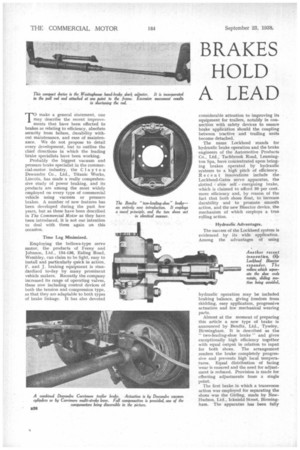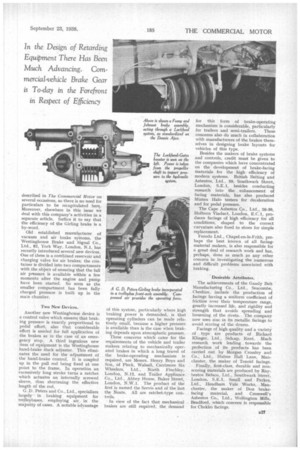BRAKES HOLD A LEAD
Page 60

Page 61

If you've noticed an error in this article please click here to report it so we can fix it.
In the Design of Retarding Equipment There Has Been Much Advancing. Commercial-vehicle Brake Gear is To-day in the Forefront
in Respect of Efficiency
make a general statement, one may describe the recent improve ments that have been effected to brakes as relating to efficiency, absolute security from failure, durability without maintenance, and ease of maintenance. We do not propose to detail every development, but to outline the chief directions in which the leading brake specialists have been working.
Probably the biggest vacuum and pressure brake specialist in the commercial-motor industry, the Clayton Dewandre Co., Ltd., Titanic Works, Lincoln, has made a really comprehensive study of power braking, and its products are among the most widely employed on every type of commercial vehicle using vacuum or pressure brakes, A number of new features has been developed during the past few years, but as these have been described in The Commercial Motor as they have been introduced, it is not our intention to deal with them again on this occasion.
Time Lag Minimized.
Employing the bellows-type servo motor, the products of Feeny and Johnson, Ltd., 134-136, Ealing Road, Wembley, can claim to be light, easy to install and particularly quick in action. F. and J. braking equipment is standardized to-day by many prominent vehicle makers. Recently the company increased its range of operating valves, these now including control devices of both the tension and compression type, so that they are adaptable to both types of brake linkage. It has also devoted considerable attention to improving its equipment for trailers, notably in connection with safety devices to ensure brake application should the coupling between tractive and trailing units become detached.
The name Lockheed stands for hydraulic brake operation and the brake engineers of the Automotive Products Co., Ltd., Tachbrook Road, Learning. ton Spa, have concentrated upon bringing brakes operated by hydraulic systems to a high pitch of efficiency. Recent innovations include thern Lockheed-Gates servo apparatus, the slotted shoe self energizing brake, which is claimed to afford 30 per cent. more efficiency and, by reason of the fact that both shoes float, to increase durability and to promote smooth action, and the new Bisector device, the mechanism of which employs a true rolling action.
Hydraulic Advantages.
The success of the Lockheed system is evidenced by its wide application. Among the advantages of using hydraulic operation may be included braking balance, giving freedom from skidding, easy application, progressive actuation and few mechanical wearing parts.
Almost at the moment of preparing this article a new type of brake is announced by Bertdix, Ltd., Tyseley, Birmingham. It is described as the " two-leading-shoe brake " and gives exceptionally high efficiency together with equal output in relation to input for both shoes. The arrangement renders the brake completely progressive and prevents high local temperatures. Equal distribution of facing 'wear is ensured and the need for adjustment is reduced. Provision is made for effecting adjustments from a single point.
The first brake in which a transverse action was employed for separating the shoes was the Girling, made by NewHudson, Ltd., Icknield Street, Birmingham. The apparatus has been fully
described in The Commercial Motor on several occasions, so there is no need for particulars to be recapitulated here. Moreover, elsewhere in this issue we deal with this company's activities in a separate article. Suffice it to say that the efficiency of the Girling brake is a by-word.
Old established manufacturer of vacuum and air brake systems, the Westinghouse Brake and Signal Co., Ltd., 82, York Way, London. N.1, has recently introduced several new devices. One of these is a combined reservoir and charging valve for air brakes; the container is divided into two compartments with the object of ensuring that the full air pressure is available within a few moments after the engine and pump have been started. So soon as the smaller compartment has been fully charged pressure is built up in the main chamber.
Two New Devices.
Another new Westinghouse device is a control valve which ensures that braking pressure is exactly proportional to pedal effort, also that considerable effort is needed for full application of the brakes as in the case of an emergency stop. A third ingenious new item of equipment is the Westinghouse hand-brake slack adjuster. This eliminates the need for the adjustment of the hand-brake control. It is coupled up in the pull rod being fixed at one point to the frame. In operation an excessively long stroke turns a ratchet which actuates an internally screwed sleeve, thus shortening the effective length of the rod.
G. D. Peters and Co., Ltd., specializes largely in braking equipment for trolleybuses, employing air in the majority of cases. A notable advantage
of this system, particularly where high braking power is demanded, is that operating cylinders can be made relatively small, because a higher pressure is available than is the case when braking depends upon atmospheric pressure.
Three concerns which cater for the requirements of the vehicle and trailer makers relating to mechanically operated brakes in which a long travel of the brake-operating mechanism is required, are Messrs. Henry Boys and Son, of Fleck, Walsall, Carrimore Six Wheelers, Ltd., North Finchley, London, N.I2, and Trailer Appliance Co., Ltd., Abbey House, Baker Street, London, N.W.I. The product of the first is named the Servis and of the last the Neate. All are ratchet-type controls.
In view of the fact that mechanical brakes are still required, the demand for this form of brake-operating mechanism is considerable, particularly for trailers and semi-trailers. These concerns also .do much in collaboration with manufacturers of the brakes themselves in designing brake layouts for vehicles of this type.
Besides the makers of brake systems and controls, credit must be given to the companies which have concentrated on the development of brake-facing materials for the high efficiency of modern systems. British Belting and Asbestos, Ltd., 59, Southwark Street, London, S.E.I, besides conducting research into the enhancement of facing materials, has also produced Mintex Halo testers for deceleration and for pedal pressure.
The Cape Asbestos Co., Ltd., 26-30, Holborn Viaduct, London, E.C.1, produces facings of high efficiency for all conditions, shaped to the correct curvature also fixed to shoes for simple replacement.
Ferodo Ltd., Chapel-en-le-Frith, perhaps the best known of all facingmaterial makers, is also responsible for a great deal of research work and has, perhaps, done as much as any other concern in investigating the numerous and difficult problems associated with braking.
Desirable Attributes.
The achievements of the Gandy Belt Manufacturing Co., Ltd., Seacombe, Cheshire, include the production of facings having a uniform coefficient of friction over their temperature range, greatly increased life, and rigidity and strength that avoids spreading and loosening of the rivets. The company now uses zinc in its metallic facings to avoid scoring of the drums.
Facings of high quality and a variety of type are products of Richard Klinger, Ltd., Sidcup, Kent. Much research work leading towards the perfection of its products has been carried out by Morgan Crossley and Co., Ltd., Hulme Hall Lane, Manchester, the maker of Tenoid facings.
Finally, first-class, durable and nonscoring materials are produced by Raybestos Belaco, Ltd., Southwark Street, London, S.E.1, Small and Parkes, Ltd., Hendham Vale Works, Manchester, the maker of Don brakefacing material, and Cresswell's Asbestos Co., Ltd., Wellington Mills, Bradford, which concern is responsible for Chekko facings.












































































































































